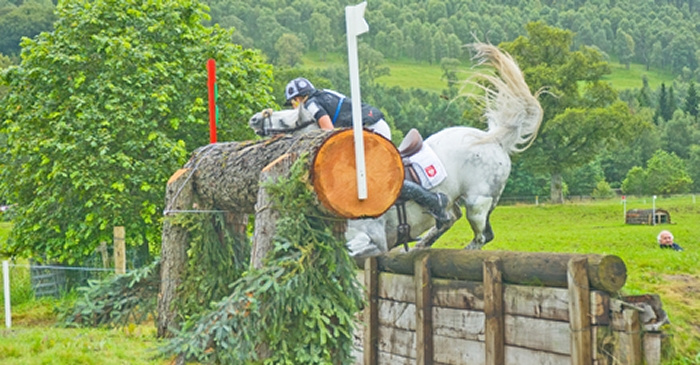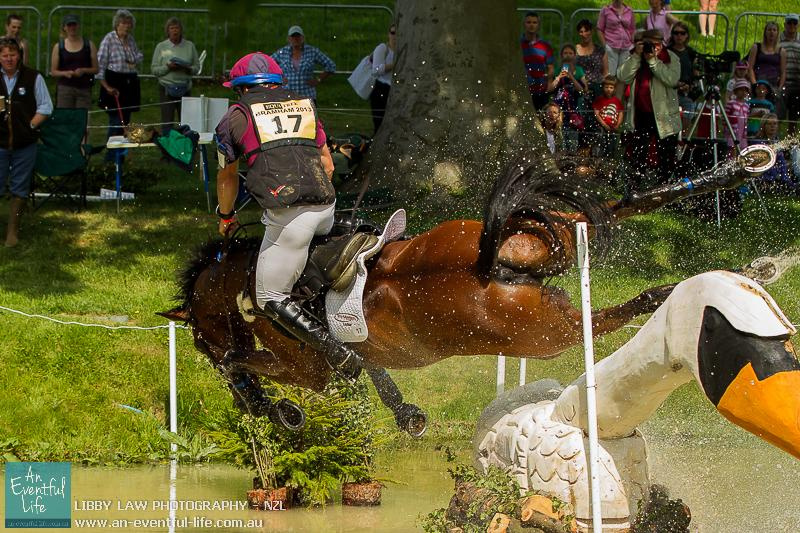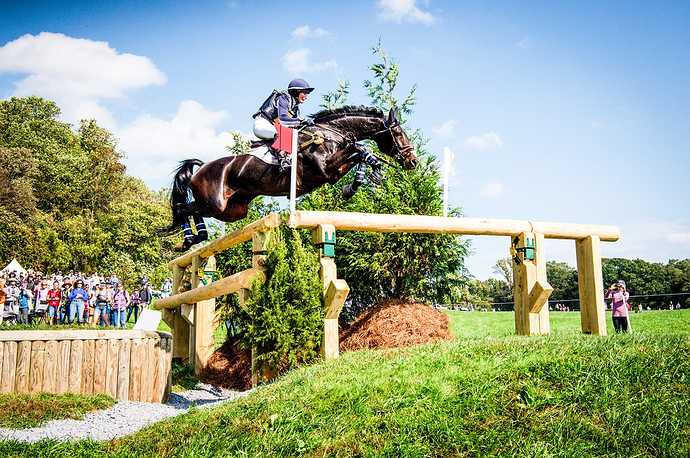So the thread is over now? Everything is fine?
No but you asked what the point was so I told you  the thread was actually dormant for a long time.
the thread was actually dormant for a long time.
I don’t buy the conditioned over years argument. My one mare went training level straight off the track with her former owner with like 2 months schooling. (Not how I would do things but she legit is a XC beast). Not enough time to condition anything at that point.
I apparently know nothing about horses or training if jumping an obstacle, progressively raised in height and difficulty, is not a conditioned response.
If that’s the level we’re at here, I think I’m done.
Because it is 100% a conditioned response. That’s not something in question.
I also agree that the “if the horse does it automatically” standard is problematic. The truth is, most people who keep horses want to ride, and as soon as you’re riding a horse and asking the horse to do things on command, then there is an element of coersion, even if it’s a friendly and respectful partnership. This doesn’t mean that some people don’t keep horses they don’t ride (retirees, mini horses), but I think the majority of people who are “in horses” are or were riders or used the horse for some type of “work.”
So if we accept some training/riding for human enjoyment is acceptable, then, yes, we have to ask how much risk is fair to ask and also how much punishment is fair to use. And this will always be a subjective question. Harsh bits? Relying upon gagets first and foremost? Grooming and shoeing for vanity rather than health? Making a unsuitable horse “work” at a specific discipline because of the needs of rider? No turnout? What about lesson horses forced to suffer some terrible beginner riding so the rider can hopefully move on and become a more skilled and tactful rider? Most of us would say “no” to a lot of these, of course. But our own perceptions, needs, and backgrounds are going to affect our answers. Which is okay.
But the fact that “what is too much” isn’t always an easy question to answer–maybe unanswerable–however, doesn’t mean that anyone who follows horse sports IMHO, must ALWAYS be asking it.
In eventing it’s an especially tough question…because when Michael Jung and Sam were at the height of their powers together, I recall them skipping through 5* with such ease it looked like a different course to even the best of the Americans, much less the lower tier of the leaderboard slogging through. Is it fair to ask highly dangerous questions even if some people can surmount those obstacles? Then you throw in the variable of accidents–I won’t use the term “freak”–but there are accidents that occur on jumps that in most instances are low-risk, but which can still have catastrophic consequences that wouldn’t occur if the horse wasn’t jumping.
I wish I could like this 100 times
So you believe a horse taken from the track to a Training level horse trials by a non professional rider was conditioned to jump in that short time?
There are also ditches, banks and water all at that level. Just to include things that are not just raising a fence a hole.
The horse didn’t do it alone did she? There was, indeed, someone riding her asking her to do the jumps?
Thinking about this: What does “conditioned” actually mean?
Does it mean - if I (horse) see a jump and the rider tells me it’s next - I must jump it - if I don’t there will be (potentially painful) repercussions
or
I see a jump - rider says it’s mine - let’s go do that because it’s fun and I like to do that.
or
is it somewhere in between.
I happen to believe my horse really likes to jump - he gets pumped when he knows it’s jumping day. Brief story: my horse got the crap scared out of him right before our stadium round (loose horse, near collision). we enter the arena and there is a brightly colored jump panel leaning against the arena fence (from bigger levels). He was terrified of that because his blood was up. BUT - as I got his eye on each jump - he was like “oh yes”, even relaxing a bit - than after the jump - back to spooking at the panel. We did get around - I think because he likes his job of jumping. He had every reason to spit the whole thing out but didn’t. Is that “conditioning” or does he actually like his job and want to do it? I prefer that latter reason because he honestly seems to tell me that.
Isn’t it the same for hunting dogs? they love hunting - the training is just so you can keep up with them and get the birds… I don’t think “conditioning” makes a hunting dog love hunting.
Yes someone was on her back.
Not sure how much they were doing though 
I think the conditioning can be either, obviously ideally without much force. Even in the second case, you can get to a dangerous mentality with the horse where they think “human has never asked me to do something I couldn’t do… let’s try and jump this wall.”
I’m not saying the horse isn’t enjoying it. I’m saying they’re conditioned to go, no matter what.
I just wish I did have the answer! I ride dressage (though I love watching eventing more than any other horse sport) and yet I still wrestle with it.
Then yeah she was conditioned to jump. Perhaps she took to it faster, perhaps she was bolder. But without some conditioning, she’d go around. They all will.
I want to know what some people think is the difference between the diving horses, and the eventers. Why is one wrong, and the other ok?
Just to clarify, this horse had already stopped at one fence earlier in that same round, and had at least one other 20 on his FEI record alone. That horse did know how to say no, and that he didn’t in that moment was absolutely wild to me. Quite rightly, no one has evented that horse (at least at FEI levels, I just did a quick search) since that incident.
For me, there are three points:
- To keep some kind of record of these incidents. Mostly, to support points 2 and 3, which are:
- To look for patterns to see if there are opportunities for improvement in safety
- To get an understanding of where public support for our social license falls, and work to improve that as well
I was asking you for examples of what concerns you about eventing because of point number three. Your responses are helpful, and in many ways demonstrate that an area we can work on is education. Certainly there are jump types out there that seem to be more statistically dangerous than others (and as @Jealoushe quite rightly pointed out, we are working to improve technology to address that). Those jumps don’t seem to be your biggest concern, which says to me there are other areas we need to focus on as well if we want to retain our social license.
I agree with you. And even people who keep horses they don’t ride still ask them to do things they would not do autonomously without training (stand for the farrier, come in and out of a stall at set times, act in a certain way when handled on the ground, etc). Most of those things are very low risk, but they are not fully without risk either. As soon as you are the person responsible for a horse, you have in some way asked them to modify their behaviour in a way that is unnatural. Even if very small, some amount of risk comes with that (I’m sure we have all known a horse at some point in our lives to have an accident in the stall). Everyone draws the line differently, and there are no easy answers.
“Go no matter what” - good god, not w/ me in the irons! My horses need the veto option because I screw up. They know that if we are really wrong or they don’t understand something, stopping is ok.
I think horses at the upper upper level generally don’t stop anymore. Maybe run out, but stopping is very infrequent.
Same with h/j. And if they still have a little of that in them, you send them to Kocher and his electric spurs take care of it. (joke, but again - they’re conditioned to GO no matter what)
@marigold I am aware of what the most dangerous fences ARE. Yet you still see them (open oxers, false ground lines, flat tables), and instead of recognizing these are questions the horses have trouble reading - we just make them frangible and “hope” that resolves the injury potential. How about a different fence all together?
Apologies for never remembering the name of the events, but another recent one rider after rider after rider were tripping the frangible on the jump into the water. No one fell because of the frangible, but why was a question that was SO unfair to the horse that so many of them got it wrong even allowed on the course? That’s stupid, especially considering that even with a frangible, a horse shin-knocking a log hard enough to trigger one has got to HURT.
I just want to say using the Cottesmore leap as your point is ridiculous. That is a rider frightener period. I do think Harry Meade got stuck on it last year, but that was past the ditch. He got down off it.
Thanks for your input, I appreciate it. Can you comment on any of the other things I’ve talked about, or is that it?
This looks comfy for the horse. Who wouldn’t want a face plant on a log, and then have to wrench your front feet back out of a ditch (or worse)? “Rider scarer” or not, this sort of stuff is not good for the horses. They’re the ones who don’t have a choice in the matter, they should be at the forefront. If scaring the rider means potentially hurting the horse, how about - let’s stop doing it.
What happens when a horse mis reads this jump? Is it worth it (MIMS or not)?
This happens in every single equestrian sport. I’m not sure why Eventing has become your core target?



